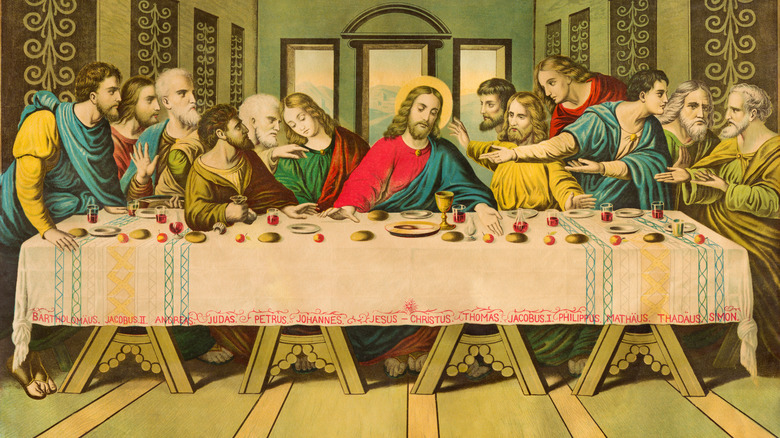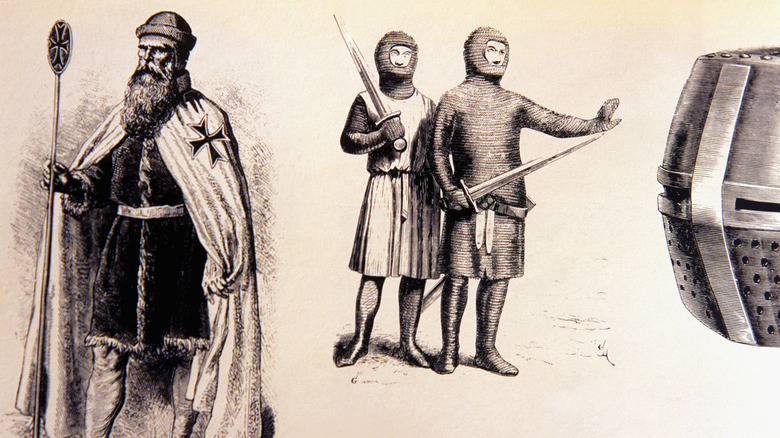The Scary Origins Behind Friday The 13th
It's a date that has become so infamous that a horror movie franchise starring some dude in a hockey mask was named after it. Regardless of the month on which it falls, Friday the 13th has become, much like black cats and broken mirrors, universally linked to bad luck. Although it is, for a lot of us, just as unremarkable as any other day of the year, the superstitious among us tend to avoid undertaking risky endeavors on Friday the 13th, in fear that things might go off the rails in one way or another. Heck, the number 13 is, in itself, considered unlucky, and as documented by InfoPlease, there are times when wearing No. 13 on one's uniform is associated with some form of bad luck. Or what about the fact that in the long history of Formula 1, very few drivers have chosen to race cars with the number 13?
We could go on with additional examples, but what's the deal with all the stigma surrounding the number 13 and Friday the 13th, to be more specific? When did people start fearing this date, and why did they feel that way in the first place? As you'll find out in a bit, Friday the 13th has multiple origin stories, and some of them may be chilling enough to justify why certain people are so superstitious about the date.
The possible biblical roots of Friday the 13th
According to History, the Holy Bible contains some of the first documented examples of why Friday and/or the number 13 may be unlucky. Naturally, there are no specific mentions of Friday the 13th in the Bible, but the Last Supper did take place on Maundy Thursday with a total of 13 people — Jesus Christ and his 12 apostles — gathered around the table. Jesus was betrayed by Judas Iscariot, the 13th guest to the Last Supper, and was crucified the next day, which was Good Friday. This led to the Christian superstition that it's bad luck to have 13 guests at a table, as doing so would potentially result in someone's death.
Is it possible, though, that Jesus died on Friday the 13th? As explained by Britannica, data from the Gospels of Matthew, Mark, and Luke suggests that he may have been crucified on what we now know as April 7 on the Gregorian calendar. But since Good Friday is now commemorated on a flexible date that falls between March 20 and April 23, there are — and will be — times when it could fall specifically on Friday, April 13.
Furthermore, the book of Genesis features a couple of tragic events that purportedly happened on a Friday. These include the day when Adam and Eve angered God by taking an apple from the Tree of Knowledge, and the day when Adam's firstborn, Cain, murdered his younger brother Abel.
The Trials of the Knights Templar started on Friday, October 13, 1307
In a separate article, History wrote that the Trials of the Knights Templar also took place on Friday the 13th, thus making them one of the first — and most terrifying — historical examples of the date being associated with unfortunate events. The Knights Templar was founded in the early 12th century with the goal of protecting Christian pilgrims traveling to the Holy Land, and the order soon amassed a remarkable fortune, largely through the donations of various European leaders.
One month before the Trials, rumors began swirling in France that the Templars were involved in black magic, sexual rituals, and other seedy activities. These rumors were spread by couriers working for the country's ruler, King Philip IV, who had a reputation as a greedy individual who previously targeted other groups for their wealth. Starting on Friday, October 13, 1307, he had over 600 Templars arrested, including Grand Master Jacques de Molay and other top officials of the military order. It wasn't just high-ranking Templars who were arrested, as there were several non-warriors who were also charged with various offenses, such as heresy, financial corruption, and devil worship.
After weeks of torture and starvation, hundreds of Templars confessed to the trumped-up charges. In 1310, dozens of the order's members, who had spent over two years imprisoned in their cells at that point, were burned at the stake at Philip's command, and in 1314, even more Templars, including Molay, suffered the same fate two years after the Knights Templar was officially dissolved.
Other historical tragedies that took place on Friday the 13th
We cannot stress it enough — most people see nothing particularly foreboding about Friday the 13th. But in recent history, there have been several tragic events that happened on that date. Per History, these include the murder of Queens, New York, bartender Kitty Genovese on March 13, 1964, which was notorious for the fact that nearly 40 people witnessed the crime but didn't bother to call the cops (via The New York Times). More than three decades later, rap icon Tupac Shakur was shot dead on September 13, 1996, and his murder remains unsolved to this day.
Other modern-day tragedies that took place on Friday the 13th include the cyclone that took the lives of hundreds of thousands of people in Bangladesh in November 1970 and the October 1972 crash of Uruguayan Air Force Flight 571 in the Andes Mountains. (The latter incident served as the basis of the 1993 film "Alive," as well as multiple memoirs written by the crash's survivors.) Additionally, on January 13, 2012, the Costa Concordia cruise ship ran aground and capsized off the coast of Tuscany, Italy, killing more than 30 people, according to Britannica.



